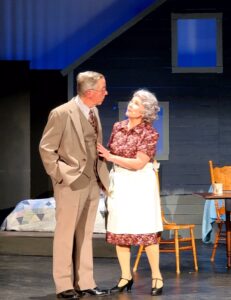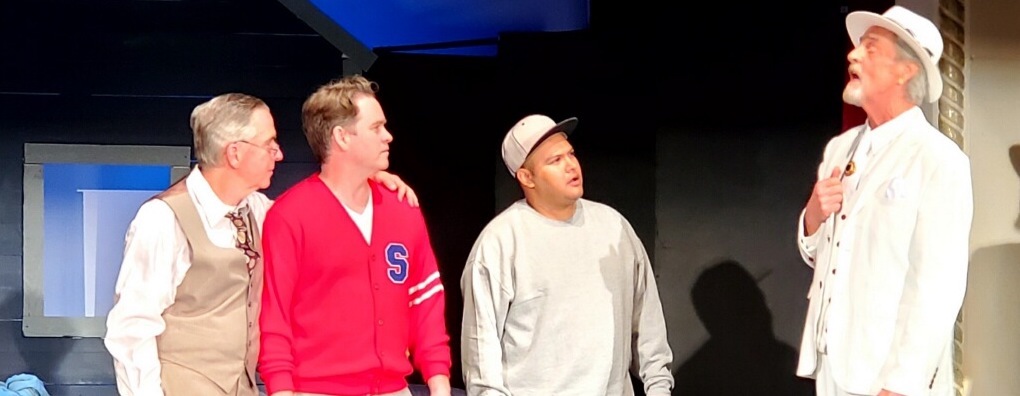This production was scheduled November 3-19, 2023.
What does it mean when a theatrical performance comes to a conclusion . . . and there is no applause?
That’s exactly what happened on opening night of Death of a Salesman, currently running through November 19 at the Cambria Center for the Arts Theatre. The audience sat in riveted silence, thoroughly mesmerized at what had transpired during the preceding three hours while a moving, well-acted, and relatable modern American take on the American dream grabbed their attention and their hearts.
Don’t misunderstand . . . hearty applause did erupt when the cast reassembled on stage for their curtain call. But it took a moment to come back to the theatre from the world that director Bryce Prunty and his mighty cast and crew have assembled and offered up for our inspection—ultimately demanding that attention must be paid, in this case to our shared hopes, failures, delusions, and dreams.

Where to start in order to convey to potential audience members the necessity of seeing this production? Do you want to experience an unrelenting interpretation of Arthur Miller’s Pulitzer Prize-winning classic presented masterfully on a local stage? Do you want to see the pieces of an intricate puzzle come together into a whole, live experience, thanks to well-designed costumes, scenery, sound, lights, and music? Do you want to enjoy the rush of excitement when performers connect with each other and the audience, creating a sense of familiarity, understanding, even compassion?
Let’s start with the music, as this exceptional production features an exceptional original soundtrack by David Norum played by flutist Talia Ortega. Her haunting notes, which open and close the show, also underscore many of the scenic and dramatic transitions.
The simple but effective set, designed and constructed by Matt Moore and Omega Zaitz, also haunts the stage as a backlit backdrop for all the action. Sound design (also by Norum), lighting by Jane Lloyd, and costumes by Karen Russu set the various scenes in time and place, showing practical but creative touches. The spectral images in white of some of the characters from Willy Loman’s past are especially compelling.
A word here about this production’s Willy Loman: the aforementioned David Norum is obviously something of a Renaissance man to take on the demanding title role while also working assiduously behind the scenes. His interpretation gives this salesman a believably wide range of emotions as he sums up his time on this earth while not quite recognizing himself in most of those expressions. He progresses through several phases, from expressing utter exhaustion, to directing a resounding anger at his son or his wife that he should be directing at himself, to desperately crying out “I am known!” It’s quite simply a bravura performance.
The other actors, especially Mary-Ann Maloof, Ryan Treller, and Edgar De La Cruz as Willy’s wife and sons, are as precise and focused as Norum. Kelli Rodda, Jonathan Shadrack, Hank Wethington, Randall Lyon, KT Jones, and Dan Costley round out the excellent cast, with Greg DeMartini, who “grows up” during the evening, especially (and quite physically) tuned in to his character.
Of course, the person responsible for keeping everyone tuned in is Prunty. In capturing the spirit of the play so well, the director makes producing a classic like this look easy, which it most definitely is not. His vision wraps the production in a profound sadness while giving little glimpses of joy: the drab gray-brown of Willy’s suits while he remembers “the lilacs and wisteria and daffodils” of earlier days; a teenage Biff’s letter sweater representing a future that doesn’t materialize after he lets a heartbreaking secret derail him; Linda dressed in funereal black as she announces she’s made the final payment on the house, which is now free and clear.
While Willy may be a purposeful but ultimately clueless architect of his own death, Prunty is something else: he is an eloquent and provocative engineer of his Death of a Salesman.
Just remember that when the lights go down at the end of Act 2, it’s okay to express your appreciation—loudly!—for such a stunning production.
